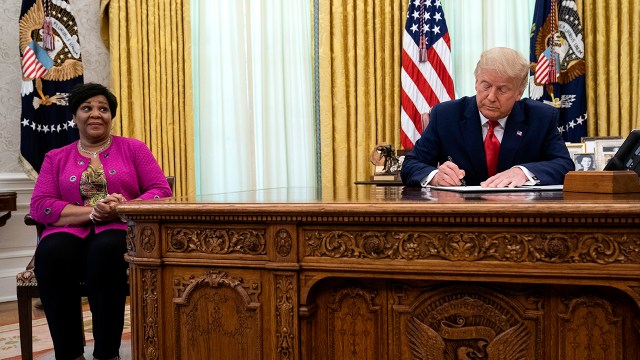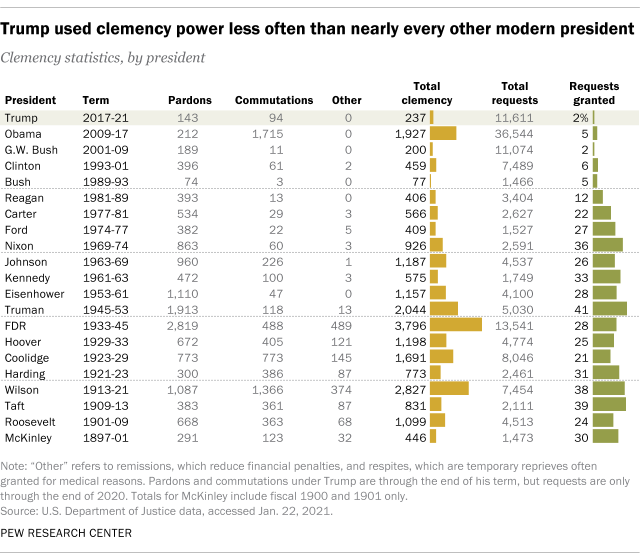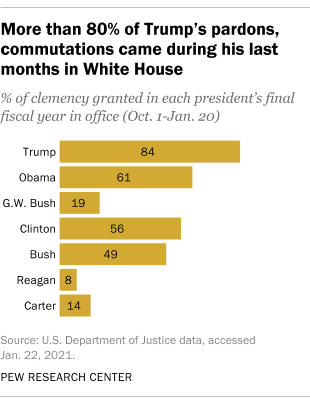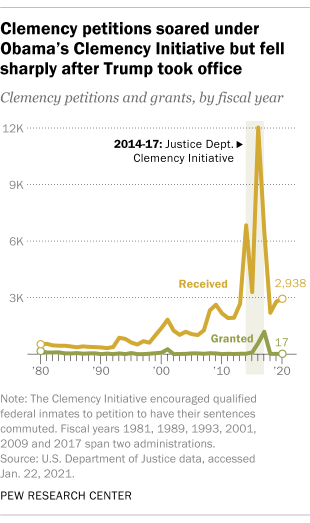
Despite a burst of pardons and commutations in his last hours in office, Donald Trump used his executive clemency power less frequently than nearly every other president since the turn of the 20th century, according to a Pew Research Center analysis of U.S. Justice Department data.
Trump granted 237 acts of clemency during his four years in the White House, including 143 pardons and 94 commutations. Only two other presidents since 1900 – George W. and George H.W. Bush – granted fewer acts of clemency than Trump.
His predecessor, Barack Obama, granted clemency 1,927 times over the course of eight years in office, the highest total of any president going back to Harry Truman. Obama’s total was skewed heavily toward commutations (1,715) instead of pardons (212).
Donald Trump ended his presidency with a wave of pardons and commutations for those convicted or accused of federal crimes. This analysis examines how Trump compares with other modern presidents in his overall use of executive clemency.
All findings in this analysis are based on data from the U.S. Justice Department, accessed Jan. 22, 2021. Pardons and commutations under Trump are through the end of his term, but requests are only through December 2020. The number of requests Trump received could be higher than reported here because of additional requests he may have received in January 2021.
All pardons and commutations issued by Trump are counted as requests granted, even in cases when recipients did not formally petition for clemency.
Looking at the same data another way, Trump granted clemency to just 2% of the 11,611 people who petitioned him for it. Only George W. Bush granted clemency to a similarly small proportion of applicants (2%). Trump’s final percentage still could end up being the lowest on record because the Justice Department has not yet published data on the number of applications he received in January 2021, during his final three weeks in office.
Clemency refers to multiple forms of presidential mercy. The two most common forms are pardons, which forgive past crimes and restore civil rights, and commutations, which completely or partially reduce sentences for those in prison or on community supervision. Two less-common forms are remissions, which reduce financial penalties associated with convictions, and respites, which are temporary reprieves that are usually granted to inmates for medical reasons.
The Justice Department’s statistics do not count clemency granted through proclamation or executive order, such as the actions taken by Presidents Gerald Ford and Jimmy Carter to forgive thousands of Vietnam-era draft dodgers.
While rare overall, Trump’s use of presidential clemency caused controversy because of the nature of his pardons and commutations. Many of Trump’s clemency recipients had a “personal or political connection to the president,” and he often circumvented the formal process through which clemency requests are typically considered, according to analyses by the Lawfare blog.
Trump was far from the only president to face scrutiny over his use of clemency. Obama’s frequent use of commutations, particularly for prisoners convicted of drug-related crimes, prompted criticism from Republicans, who said it benefited “an entire class of offenders” and infringed on the “lawmaking authority” of the legislative branch. And President Bill Clinton drew bipartisan condemnation for pardoning a fugitive commodities trader, Marc Rich, on his last day in office in 2001.
Trump also wasn’t the only president to save many of his pardons and commutations for his last hours on the job. In fact, every president from Ford to Trump issued pardons or commutations in his last days in the White House, according to the Justice Department. Obama, for example, granted 330 acts of clemency on Jan. 19, 2017, and Clinton granted 177 on Jan. 20, 2001.
Trump, however, still granted an unusually large percentage of pardons and commutations late in his term. More than eight-in-ten of his total acts of clemency (84%) came in his final fiscal year in office (the period between Oct. 1 and Jan. 20). That was far higher than the share for other recent presidents, including Obama (61%), Clinton (56%) and George H.W. Bush (49%).
Presidents have generally become less forgiving over time, at least when looking at the proportion of clemency requests they have granted. Every president from William McKinley to Carter granted clemency to at least 20% of those who asked for it, according to the Justice Department data. But the percentages have fallen to the single digits for every president since George H.W. Bush, including Obama, who granted clemency to just 5% of those who petitioned him for it.
Obama’s relatively low percentage was largely due to the fact that his administration encouraged federal prisoners to apply for leniency under a program known as the Clemency Initiative. The program, which launched in April 2014 and ended when Obama left office in 2017, allowed “qualified federal inmates” – those who met certain Justice Department criteria – to apply to have their prison sentences commuted.
Overall, Obama received more than 36,000 clemency petitions during his time in office, by far the largest total of any president on record. Petitions declined sharply after Trump took office.
Note: This is an update of a post originally published on Dec. 9, 2016, and previously updated on Nov. 24, 2020.






